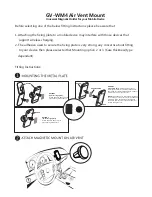
- 118 -
VX9100
LGE Internal Use Only
Copyright © 2007 LG Electronics. Inc. All right reserved
Only for training and service purposes
CHAPTER 5. Safety
CHAPTER 5. Safety
▣
IMPORTANT
Read This Information Before Using Your Hand-Held Portable Cellular Telephone
First introduction in 1984, the hand-held portable Cellular telephone is one of the most exciting and innovative
electronic products ever developed.
With it you can stay in contact with your office, your home, emergency service, and others. For the safe and efficient
operation of your phone, observe these guidelines.
Your Cellular phone is a radio transmitter and receiver. When it is ON, it receives and also sends out radio frequency
(RF) energy. The phone operates in the frequency range of 824 MHz to 894 MHz and employs commonly used
frequency modulation (FM) techniques. When you use your phone, the Cellular system handling your calls controls
the power level at which your phone transmits. The power level can range from 0.006 of a watt to .6 of a watt.
▣
Exposure to Radio Frequency Energy
In 1991 the Institute of Electrical and Electronics Engineers (IEEE), and in 1992 the American National Standards
Institute (ANSI) updates the 1982 ANSI Standard for safety levels with respect to human exposure to RF energy.
Over 120 scientists, engineers, and physicians from universities, government health agencies, and industry, after
reviewing the available boy of research, developed this updated Standard. In March, 1993, the US Federal
Communications Commission (FCC) proposed the adoption of this updated Standard.
The design of your phone complies with this updated Standard. Of course, if you want to limit RF exposure even
further than the updated ANSI Standard, you may choose to control the duration of your calls and operation your
phone in the most power efficient manner.
▣
Efficient Phone Operation
For your phone to operate at the lowest power level, consistent with satisfactory call quality, please observe the
following guidelines:
If your phone has an extendable antenna, extend it fully. Some models allow you to place a call with the antenna
retracted. However, your phone operates more efficiently with the antenna fully extended.
Hold the phone as you would any other telephone. While speaking directly into the mouthpiece, position the antenna
up and over your shoulder.
Do not hold the antenna when the phone is “IN USE”. Holding the antenna affects call quality and may cause the
phone to operated at a higher power level than needed.
▣
Antenna Care and Replacement
Do not use the phone with a damaged antenna. If a damaged antenna comes into contact with skin, a minor bum may
result. Replace a damaged antenna immediately. Consult your manual to see if you may change your antenna yourself.
If so, use only a manufacture approves antenna. Otherwise, take your phone to a qualifies service center for repair.
Use only the supplied or approved antenna. Non-approved antennas, modifications, or attachments, could impair call
quality, damage the phone, and violate FCC regulations.
Summary of Contents for VX9100 Maroon
Page 135: ...1 VX9100 Assembly Disassembly Diagram ...
Page 136: ......
Page 137: ......
Page 138: ...2 VX9100 Block Circuit Diagram Main Key Pad FPCB ...
Page 139: ...Block Diagram ...
Page 141: ...Circuit Diagram Main Key Pad ...
Page 142: ...Main Board Circuit ...
Page 149: ...Keypad Circuit ...
Page 151: ...3 VX9100 Part List Main Key Pad FPCB ...
Page 161: ...4 VX9100 Component Layout ...
Page 164: ...5 VX9100 BGA Pin Map ...
Page 165: ...BOTTOM VIEW Unit mm USED NOT USED 1 MSM6550A U202 A1 Index Mark ...
Page 167: ...3 MAX9775EBX T U301 TOP VIEW USED NOT USED ...
















































